-
|
25 April 2024
|Posteado en : Inf first person
Leaning on the railing of the upper floor of the cloister of the Centro de Formación de la Cooperación Española in Antigua Guatemala, I contemplate a beautiful spectacle.
Looking up, I can see the summit of the Fuego volcano, one of the three volcanoes (Fuego, Agua and Acatenango) that surround what was the capital of the Captaincy General of Guatemala until 1773, when the Santa Marta earthquakes destroyed the city for the third time in a century, looming over the roofs of this beautiful building, which was once a Jesuit convent.
Downstairs, among the pretty arcades of the courtyard, my colleagues from the Euroclima Programme – a colourful and diverse group of people from all corners of Europe, Latin America and the Caribbean – move from one huddle to another in a lively mix of choreography and conversation.
Watching all this in the quiet evening, I think it makes perfect sense that the Annual Meeting of the Euroclima Programme is taking place in this beautiful colonial town of Antigua Guatemala.
On the one hand, the history of the place and the ruins of churches shattered by successive earthquakes that adorn its corners remind us of the destructive force that nature can have. At the same time, the fact that Antigua is still standing, despite everything, is an example of the resilience of the people of Guatemala.
All this immediately brings me back to the issue that concerns us colleagues from the various European cooperation institutions and United Nations agencies that implement the Euroclima Programme and our Latin American and Caribbean counterparts: to find ways, through appropriate and relevant public policies, to mitigate the effects of climate change on the countries of Latin America and the Caribbean and adapt to climate changes that are already irreversible, promoting sustainability and resilience of societies in the region.
On the other hand, I feel that the history of this mestizo country is also reflected in what we have experienced during these days in the halls of the Spanish Cooperation Training Centre in Antigua: an exchange and dialogue between groups of people of different races and cultures who are beginning to travel a path together, without forgetting their past trajectories, but fundamentally looking forward, towards a common goal.
This is particularly evident at this year’s Annual Meeting of the Euroclima Programme, as for the first time 14 Caribbean countries are formally participating in the meeting. The Caribbean enlargement has made the Euroclima family, as we like to call ourselves, an even more heterogeneous group of 33 countries.
More heterogeneous… and more ambitious
Because at Euroclima, we are constantly taking on new objectives to tackle the three interrelated planetary crises that threaten the survival of human life on the planet: climate change, biodiversity loss and pollution.
Therefore, in 2023 we broadened our thematic focus to include priorities beyond climate change mitigation and adaptation issues, with particular significance being given to issues related to the circular economy and strengthening biodiversity conservation and ecosystems, always with a focus on inclusiveness, human rights and gender.
In addition to geographical and thematic expansion, two elements were particularly significant for Euroclima in 2023: the relaunch of relations between the European Union and Latin America and the Caribbean following the EU-CELAC summit that took place in July 2023, and the launch of the European Strategy Investment Agenda “Global Gateway”, which will allow Euroclima not only to drive improvements in climate policies, but also to facilitate the implementation of ambitious infrastructure projects to advance the region’s green transition.
These new ambitions are backed by the EUR 100 million (EUR 50 million already granted and EUR 50 million in the process of being approved) which the European Union has entrusted to the Euroclima Programme to manage over the next few years. This is a serious responsibility indeed.
All these questions float on the wind of this peaceful evening. The sun is starting to set and I think it’s all good. The challenges and the responsibility are great, but so is, as the director of the FIIAPP’s Development and Environment Department, Sonsoles Mories, stated just a few minutes ago at the closing ceremony of the meeting, our commitment.
-
|
09 April 2024
|Posteado en : Inf first person
Risk and harm reduction is a key strategy in dealing with the problems associated with drug use. In Spain, this strategy began during the heroin pandemic that hit the country in the 1980s.
On the occasion of World Health Day (April 7), the Government Delegate for the National Plan on Drugs, Joan Ramón Villalbí, reflects on the challenges presented by other substances such as methamphetamine or crack and whether we can apply the heroin experience to these.
“We need to explore options for stimulant psychoactive substances such as methamphetamine or crack which, although now little consumed in Spain at the moment, have great destructive potential” – Joan R. Villalbí (DGPNSD)
A challenge also for international cooperation, which promotes the exchange of knowledge, experiences and good practices to improve people’s lives.
You can read the full blog here, on the website of the European program COPOLAD co-led by FIIAPP.
-
|
16 February 2024
|Posteado en : Inf first person
Javier Hernández, dedicates a few words at the end of the project to the work carried out and the people involved
Javier HernándezThe first phase of the CT-PUBLIC SPACES project came to an end on 5 January, as we remain confident that cooperation in counter-terrorism with other countries can be continued in a second phase in the near future.
Promoting security, sustainable growth, social and human development in partner countries is a high priority for the European Union (EU). In this regard, it works with them to promote peace, stability and economic prosperity. The nexus between security and development is of great importance. The EU has a strategic commitment to combat terrorism globally, respecting human rights with the aim of making our societies safer.
As is already known, the project originated from the European Commission’s interest, initially through the Directorate-General for Development and Cooperation (DEVCO) and later with the Foreign Policy Instruments Service (FPI), in sharing with other countries the experiences acquired in Europe in the protection of public spaces, with large numbers of people, against terrorist threats.
In 2015, following the series of attacks suffered in Europe and other parts of the world, the European Commission designed an Action Plan which, among other things, involved the creation of a forum for the exchange of experiences in the protection of public spaces, the aforementioned forum is the HIGH RISK SECURITY NETWORK (EU-HRSN). The Spanish Civil Guard belongs to this forum, through the Rapid Action Group (RAG), which was commissioned to lead a project called “CT-PUBLIC SPACES”, financed by the European Union, to transfer and share with other countries the experiences acquired, as well as new developments in tactics, techniques and procedures in the fight against terrorism. Ghana, Kenya and Senegal were the countries initially offered to participate.
The project’s objective is to prevent terrorist attacks and, if necessary, to reduce their effects in public spaces with a large number of people. The International and Ibero-American Foundation for Public Administration and Policies (FIIAPP), as the legal contracting entity, and the support of the EU-HRSN have been involved in its implementation.
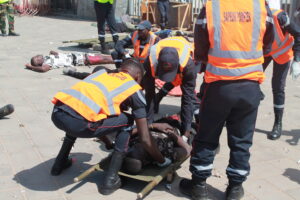
Mock attack training in Kenya After four years of exciting and intense work, a set of activities covering many of the aspects related to the protection of public spaces against terrorist threats have been carried out and have allowed:
- Raising awareness of all political and police decision-makers.
- Improving the application of capabilities in: Command and Control, Risk Analysis, as well as in the use of: tactics, techniques and procedures to PREVENT, PROTECT, REACT and RECOVER in the event of a terrorist attack.
- Encourage cooperation between law enforcement and private security. We live in an increasingly interconnected and uncertain world, so we must make more effort and update ourselves as much as possible to continue working for the benefit of our society.
I am sure that the collaboration and cooperation between all will continue; the contacts established, at different levels, between the Counter-Terrorism Fusion or Coordination Centres of Ghana, Kenya, Senegal, Member States and Delegations of the European Union, the participation of police forces as observers in the EU-HRSN, the personal and professional relations between the experts of the European Union and those of the partner countries, as well as the possible second phase of the Project, will allow us to achieve this continuity and sustainability.
In closing, I would like to express my most sincere thanks to all those who, in the exercise of their responsibilities and with their personal commitment, have made it possible to carry out this task. The list of people would be long and I do not want to leave anyone without this public recognition, so I will refer to the organisations and institutions:
- European Commission, through the Directorate-General for Development and Cooperation and the Foreign Policy Instruments Service.
- Fundación Internacional y para Iberoamérica de Administración y Políticas Públicas –FIIAPP (International and Ibero-American Foundation for Public Administration and Policies).
- EU-High Risk Security Network; EU-HRSN.
- Counterterrorism Coordination Centres: Counter Terrorism Fusion Center of Ghana National Counter Terrorism Center of Kenya Cadre Interministériel de Coordination des Opérations de lutte anti-terroriste (CICO-LAT) of Senegal.
- Centro de Inteligencia contra el Terrorismo y el Crimen Organizado of Spain (CITCO).
- Police forces: Ghana Police Service Kenya National Police Service Police Nationale et Gendarmerie du Sénégal.
- International programmes: UNOCT, SENSEC, NORPREVESEC, GARSI-Sahel…
- And of course the Spanish Guardia Civil, who, mainly with the Rural Action Unit and the Information Headquarters, have led the implementation of the project. Finally, I would like to thank the effort, interest, dedication and work carried out by the entire team that I have the honour of leading, which leaves us with the intimate satisfaction of a job well done.
Javier Hernández
Colonel of the Guardia Civil and director of the CT Public Spaces project.
13 December 2023
Posteado en : Inf first person
The chronicle is the closest journalistic genre. In the chronicle, particular human stories tell about common human problems
The chronicle does not usually get much space in the media: it requires time, resources, going to places, and the skill to write with care and beauty. That is why we chose the chronicle for the first edition of a journalism training within the FIIAPP’s EU-supported project against drug trafficking in Bolivia. The chronicle is a genre that allows us to delve into sensitive social issues such as drug use, the theme of the workshop, and to approach them from their complexity. The media has a fundamental role in educating society and a great capacity to break (or perpetuate) stigmas.
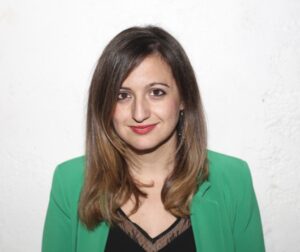
I am Cristina García Casado, journalist, and I was in charge of giving this training, first in La Paz (from 30 to 3 October) and then in Santa Cruz de la Sierra (from 6 to 10 November). I designed it from my journalistic and chronicle library, from what I learned in workshops with masters of the genre such as Martín Caparrós and Leila Guerriero, and from my professional experience of more than 15 years in international media in the United States, Latin America and Spain. The participants appreciated the fact that we proposed a training with a high practical component, given that this is often a lack in journalism studies, despite the fact that it is a profession that can only be learnt by doing. With the participation of the students, we managed to generate dynamic sessions of multidirectional learning.
The training was delivered in collaboration with the Plurinational Public Management School (EGPP) in Bolivia. The profile of the participants was diverse and intergenerational. There were public sector communicators, journalism teachers, working media journalists and students of social communication, which is the name given in Bolivia to the degree course to which journalism and related studies belong. In La Paz, the course was held at the offices of the EGPP, while in Santa Cruz the venue was a training centre of the Spanish Agency for International Development Cooperation (AECID).
“Communication plays a decisive role in understanding the human stories that underpin public policies”
Throughout the training, it was possible to see the importance of tackling projects such as this one against drug trafficking also from the perspective of journalism and communication, two key disciplines when it comes to shaping social narratives and thus combating prejudices and stereotypes that hinder the recognition of problems and the search for solutions. Each of the participants looked for a story related to drug use, reported it, wrote it down and, together, we analysed all of them and drew useful lessons for their respective present and future professional practices.
For me, as a journalist and trainer, this mission has been a very important experience and has motivated me to continue contributing to the public sector and international cooperation through communication. Communication plays a decisive role in understanding the human stories that underpin public policies, since public policies must be designed to improve people’s lives. Missions like this one remind us all that public policies are not something abstract, but that they address the day-to-day lives of citizens in a transformative spirit.
Cristina García Casado, journalist
05 September 2022
Posteado en : Inf first person
Two delegations of foreign ministry and migration officials from Colombia and Ecuador arrive in Spain, on a study visit organised by the EUROFRONT programme, to learn about the border control model implemented in the Schengen area
Gema Palencia, a EUROFRONT technician, recounts the visit, which takes place between Madrid, Algeciras and Tarifa, in the form of a diary. A journey under the certainty that the only way to tackle transnational crime is through cooperation.
DAY I. 5 September 2022
There will be five days of visits to police institutions for migration management and cooperation, as well as border posts at airports and ports.
An interesting opportunity offered by the European Union programme co-led by the FIIAPP, EUROFRONT, to exchange processes and procedures, learn efficient interventions on both sides and find opportunities for collaboration that can be applied to Colombia and Ecuador and the other countries with which the programme collaborates: Argentina, Brazil, Bolivia, Peru and Paraguay.
With enthusiasm and the hope that from the meeting we will find greater opportunities for collaboration… Let’s get started!
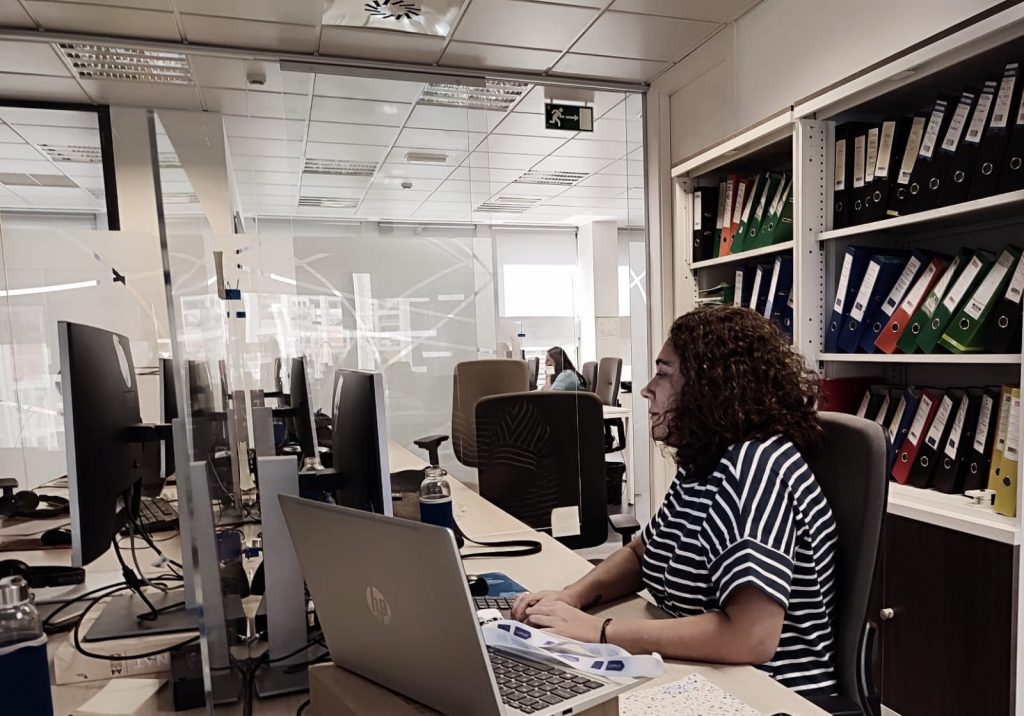
At the General Commissariat for Foreigners and Borders I meet the members of the delegations in person, and after numerous e-mail correspondence it is pleasant to put a face and a voice to the participants.
Despite the jet lag, they were particularly participative during the presentation by Commissioner General Julián Ávila Polo and in the subsequent presentations on the different units that make up the General Commissariat.
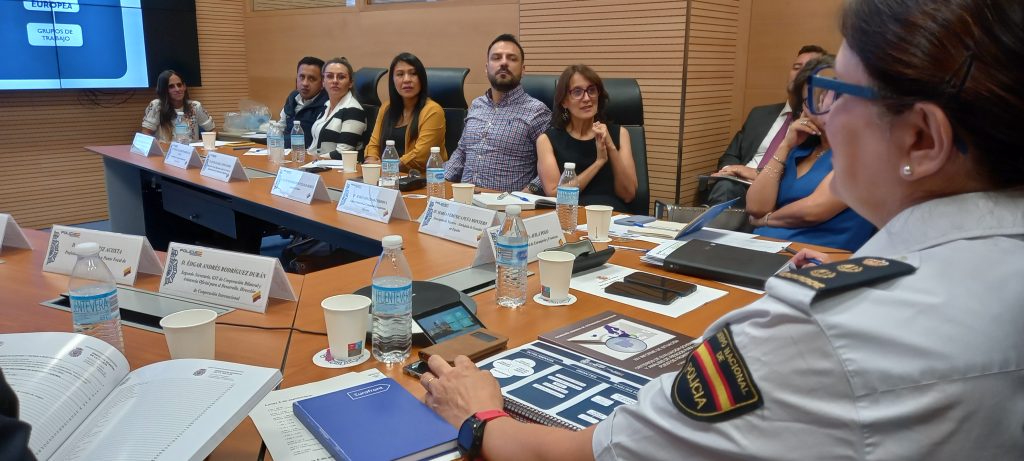
Among the comments, the issue of the Venezuelan problem, common to all countries, and the exchange of information, came up for discussion. Another topic of interest is the successful experience of Punto Atenas, an operational document verification service run by experts in document forgery, which in ten months has dealt with 3,400 queries from various authorities. The idea of replicating a similar system in the Latin American region is met with great interest.
The afternoon is devoted to Barajas Airport and to getting to know in situ the operational border management in the Schengen area.
Full day 1, intense and with many open questions. We continue…
DAY II. 6 September 2022
On the way to the International Cooperation Division of the police, comments revolved around the previous day’s visit to Barajas Airport. The means of detecting forged documents or automated passages captured the most interest of the tour.
Information exchange and cooperation were the key words of Tuesday’s session. Based on the conviction that this is the only way to tackle transnational crime, the functions and effective results of the SIRENE Office, an exchange point with European police forces, as well as those of the INTERPOL and EUROPOL offices, were presented.
I continue to be surprised by the high level of interest of the delegations, and not only me, but also the rapporteurs, who are grateful to have such active participants. During his presentation, the Head of the Operational Section of the SIRENE bureau, Agustín Hernández, points out:
“A large part of today’s organised crime is transnational, therefore international police cooperation is essential to tackle it”
And among the debate arises the need to share data to combat new forms of irregular migration, and as an example, the citizens of Central Asian countries who use South American airports as a gateway to reach the United States.
The Division is also the key point of collaboration with Spanish Cooperation institutions, as it participates in the management of around 30 international projects, several of them implemented by the FIIAPP.
In the afternoon, train to Algeciras to learn about Operation Minerva and border management in the port area.
On the road…
DAY III. 7 September 2022
In the Bay of Algeciras, a sea and an ocean meet, two continents come together and cultures cross. A key point of entry to Europe from Morocco, between June and September it can see up to 2.5 million people pass through.
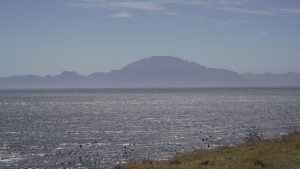
The delegations from Ecuador and Colombia have learned in situ how police teams with members of up to 17 nationalities are integrated to support the control of trafficking in persons and goods within the framework of Operation Minerva of the European Border and Coast Guard Agency (Frontex) and led by the Spanish National Police during the summer months.
This coordinated action streamlines management thanks to the specific knowledge of each country’s agents and the ease of access to their countries’ databases, which allows for rapid verification of travel documents.
An example of cooperation that has shown them the possibility of extending the current bilateral agreements that each country has with its neighbours to a regional level. The Undersecretary of the Ecuadorian Migrant Community, María Soledad Córdova, stressed that:
“The European Union is a strategic ally in border management and in addressing the challenges of migration”
They are struck by the magnitude of the movement of passengers, vehicles and goods and the effective organisational machinery in Tarifa and Algeciras, as well as the detection of irregularities and the effective cooperation that serves to alert or prevent crimes in other European countries.
It is also surprising how close Africa can be seen from the bay, much closer than it appears on the maps.
From the comments among the group and with the agents at the border, I perceive that the reflections after what we have heard and witnessed these days are taking more and more shape.
Day IV. 8 September 2022
After visiting the headquarters of the Central Unit for Illegal Immigration Networks and Documentary Forgery (UCRIF) in Madrid, we see the work on the ground in the Algeciras office.
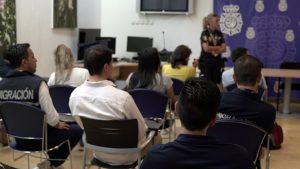
Issues detected at border controls are in many cases the thread that is pulled to unmask human or capital trafficking networks, or the clues that are shared with other international police forces, the missing piece of the puzzle to stop gangs that operate globally.
The second secretary of the Colombian Foreign Ministry’s International Cooperation Directorate, Andrés Rodríguez, points out during the visit:
“Migration challenges at the border must be addressed jointly and EUROFRONT is a programme that can provide important lessons for Colombia”
Questions about deadlines and procedures for irregular cases or the comparison of different legislations are the main part of the debate during the last day of the visit to Algeciras, in which delegations finalise all aspects related to cross-border crimes, from detection and control to investigation.
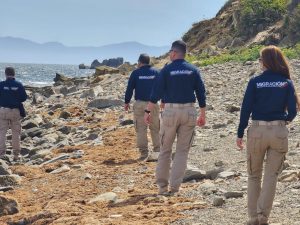
And back on the train to Madrid… time for reflection. Friday’s day of conclusions looks set to be interesting.
Tomorrow we continue…
Day V. 9 September 2022
Last day….
We closed by learning about the ADEXTTRA database containing information and registration of foreigners. A swarm of interconnected databases, from various sources, which allows the cross-referencing and extraction of information of great use both for the police and for various public institutions that manage the issuance of documents and various procedures with foreigners.
The final assessment puts on the table new paths to follow in terms of training, bilateral and regional cooperation following the European model of the Athens Point, legislative harmonisation and formal follow-up, when the delegations return to their countries and the proposals to be followed are institutionally validated.
If there is one thing they all agree on, it is the positive thing of having seen that it is possible, and the high effectiveness of police and institutional cooperation, which is essential to combat cross-border crime.
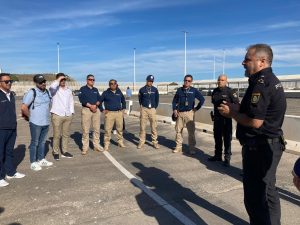
The FIIAPP and EUROFRONT have also received some interesting learning. Víctor Suárez and Agustín Hernández, experts in foreigners from EUROFRONT who organised the technical visit and accompanied the delegations, emphasise how productive the exchange was and how productive it was to learn about other forms of management. They have now also noted down some highly recommendable ideas to incorporate into the processes in Spain.
The visit is over, but we are continuing with a closer and more effective collaboration, adapted to the needs of each country.
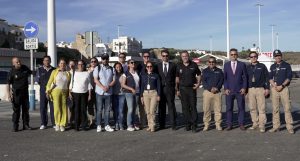
We go on…. And we are doing much better.
07 December 2017
Posteado en : Inf first person
If one thing characterises EUROsociAL+, it is seeking answers to the questions posed by Latin America
“When we had the answers, they changed the questions”, said Pelayo Castro referring to a graffito discovered by the Ecuadorian poet Jorge Enrique Adoum and made universal by the Uruguayan writer Mario Benedetti. This catch-phrase, quoted by the European Union Ambassador in Costa Rica at the opening of the EUROsociAL+ meeting in San José, laid the foundation for the three days of discussions and exchanges in the capital of Costa Rica.
Because, if one thing characterises EUROsociAL+, it is seeking answers to the questions raised by Latin America. The answers are to be found in Europe and in Latin America, and in Costa Rica they were transformed into reality with significant commitments to fighting gender violence, social dialogue and regional development.
Also, in this third stage of the Latin American social cohesion programme, we would like to be part of the answers. This means being more strategic, once again placing social issues on the European-Latin American cooperation agenda and contributing to ensuring that countries meet the Sustainable Development Goals. This is why we demanded even more strongly that actions be implemented to support public policies that have a real effect on reducing the inequality gap in the region.
The initial meeting was not only inspiring because of the discussions, it also presaged an unforgettable cultural moment that occurred during the first annual meeting of the third stage of EUROsociAL. Creativity laboratories gave a voice to the different realities existing in the Latin American countries through children and young people at risk of exclusion, the struggle of the LGBT community, and the situation of those who are in detention, who, through poetry, painting and photography expressed their wish to be part of a society that offers them the same rights and the same opportunities as anyone else.
It was a meeting filled with symbols, from the word Freedom, which was the name given to the Metropolitan Park where the meeting began, to the former prison known as “La Peni”, which has now become the Children’s Museum and which we visited on the occasion of Universal Children’s Day. The best way, therefore, to end these lines is the prologue written by Kennly Garza, subdirector of the Vilma Curling Comprehensive Care Centre, for the book of poems written by the inmates of this prison, entitled “Luna compartida” (Shared Moon). In the prologue, entitled “Alquimistas de significados” (Alchemists of meaning), Kennly calls our attention to some of these allegories: “A women’s prison is an uncomfortable, antagonistic place; the unsuspected arrival of cherubim brings on a smile. At the back, the whispers of five hundred writers disturb our conscience when we know we are part of these stories. A scene of losses and grievances, it is also an island of warrior women whose stories deserve to be told before the River Cañas claims its own. Until then, here is the tribute of their words, transparent and direct, warning that while there are women in prison writing about inequality, talking about freedom will never be easy or commonplace, it is an urgent debt that only applause does not endorse”.
Enrique Martínez is the communications manager for the EUROsociAL+ programme




